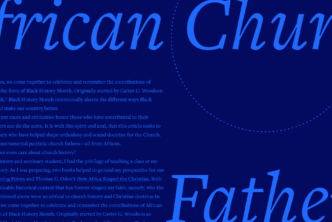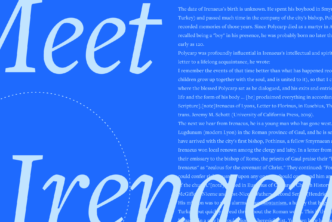The first of Luther’s famous 95 Theses—whose 500th anniversary we celebrate today—is a critique of an erroneously translated phrase in Jerome’s translation of Matthew 4:17. In English we know this as, “Repent, for the kingdom of heaven is at hand.” Luther wrote in Thesis 1,
When our Lord and Master Jesus Christ said, Poenitentiam agite, he willed the entire life of believers to be one of repentance. (See Luther’s Works, 31:25)
Luther does not come out and say that Jerome erred—not on October 31, 1517. But by at least May 30, 1518, writing to mentor Johann von Staupitz, he feels that the Roman church was indeed “misled by the Latin term, because the expression poenitentiam ag[ite] suggests more an action than a change in disposition.” It makes Jesus sound like he’s saying, “Do penance.” And, Luther says, “in no way does this do justice to the Greek.” (Luther’s Works, 48:67–68) What Jesus really said was, “Repent.” And as Luther says in the second of the 95 theses, he meant “inner repentance” producing “various outward mortifications of the flesh.” (31:25)
Luther’s nailing of the 95 theses on the church door is symbolic (so symbolic that it probably didn’t happen; ah well)—it is the moment we’ve collectively chosen to anoint as the beginning of the Reformation precisely because it symbolizes so many Reformation values: the power of the written word (and the printing of it, as our Reformation timeline shows); the importance of individual conscience; the possibility that one voice can successfully protest against corrupt institutions; and even—though the point is subtle—the importance of Bible translation.
Because if poenitentiam agite is a bad translation, how do we make sure such mistranslations don’t happen again? How can we give God’s words reliably to people who don’t speak Hebrew and Greek? Luther and the Reformation saw with new clarity that the Bible demands to be translated into the language of the people.
A new defense for Bible translation
This doctrine needed defense in Luther’s time, and in view of today’s new threats it needs new defenses. Because the Bible is written in (basically) two different languages, it demands to be translated.
Could God possibly have intended for his words to be available only to those relatively few people in history who understand both biblical Hebrew and Koine Greek (and a smattering of Aramaic)? No—Jesus told his disciples to teach “all nations” and to be his witnesses “to the end of the earth.” I would argue that both testaments are a necessary portion of that teaching and witness: the Hebrew Bible is part of God’s authoritative revelation. Jesus treated it that way, as did Paul and the early Christians. Where the apostles went, so did both testaments (as the latter developed, of course).
And where the Old Testament went in the early church, it went in Greek translation, namely the Septuagint. The Christian religion, following a major precedent set by the Jews and accepted by Christ’s followers, has always properly been one in which translation was welcome and needed.
As many have pointed out, this is not true of Islam: the Qur’an is written in one language, seventh-century Arabic. And though Islamic theologians have not been united on this point, the general feeling “to this day,” says Reza Aslan, is that “non-Arabic versions of the Quran are…interpretations of the Quran[, not translations]. Unless the original Arabic verses are embedded on the page, it cannot technically be called a Quran.”
Christians have not had similar qualms. Leather covers the world over bear HOLY BIBLE, or SVET BIBLIJE, or SANTA BIBLIA (when I was young I saw in this in bookstores not realizing it was Spanish and thought it was a Christmas-themed study edition: the Santa Bible!?). Although there is an ultimate difference between the Greek and Hebrew originals and their various translations—a translation is God’s Word only insofar as it reflects those originals—a faithful preacher can easily go a few months never needing to mention this fact. When I preach, I self-consciously stand behind the pulpit, hold up an English Bible, and tell my church people, “Thus saith the Lord.”
A Reformation reason to have multiple Bible translations
But then, Bible translations such as the Vulgate can produce errors—or (more likely) misunderstandings. Most Christians are, to some degree, at the mercy of translators to do their job well. There has to be room for a Luther to come along and not only point out the offending phrase but offer an alternative, as the German Reformer did by translating the Bible into his own heart language. Luther couldn’t unseat the Latin Vulgate’s error by himself. All he could do was offer that alternative.
For all the acrimony created today by the existence of alternative English Bible translations, I’m deeply glad they exist. They are a good fruit of the Reformation. When all we have is one translation, misunderstandings are less likely to be caught. The mere existence of alternatives ought to give Christians confidence that they don’t have to be tripped up by a mistranslated phrase. They have resources to help them avoid another poenitentiam agite. If one translation is slightly misleading (or, rarely, outright wrong), another will complement it or correct it.
What we do have, thanks in large part to Luther and his Reformation, is access—access to the truth of God’s words through multiple good translations in our own languages. Luther’s own assessment of his historical role points to that word. He wrote,
I opposed indulgences and all the papists, but never with force. I simply taught, preached, and wrote God’s Word; otherwise I did nothing. And while I slept, or drank Wittenberg beer with my friends…, the Word so greatly weakened the papacy that no prince or emperor ever inflicted such losses upon it. I did nothing; the Word did everything. (Luther’s Works, 51:77).
Mark L. Ward, Jr. received his PhD from Bob Jones University in 2012; he now serves the church as a Logos Pro. His most recent book is Authorized: The Use and Misuse of the King James Bible (forthcoming, Lexham Press).
***





